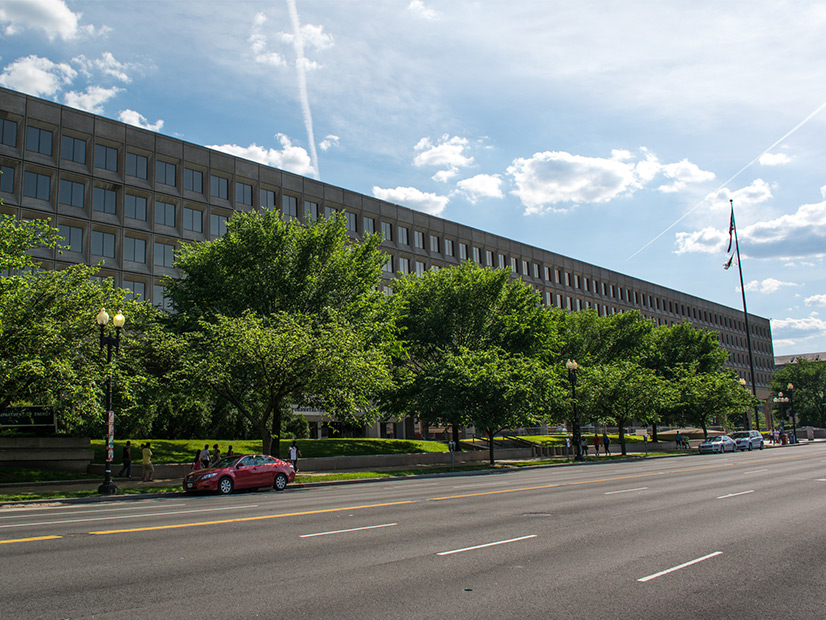The D.C. Circuit Court of Appeals on Friday dismissed a petition from the Union of Concerned Scientists (UCS) calling for a review of Department of Energy rules concerning disclosure of critical electric infrastructure information (CEII), saying that UCS lacked standing to bring the complaint.
The petition by UCS concerns DOE’s new administrative procedures for CEII. DOE issued the rule in March 2020 under Section 215A of the Federal Power Act (FPA), which allows both DOE and FERC to designate information as CEII “pursuant to the criteria and procedures established by [FERC].”
FERC’s CEII criteria, established in 2016, defines the term as “specific engineering, vulnerability or detailed design information” about existing or future critical infrastructure, physical or virtual, that could:
- provide details about the production, generation, transmission, or distribution of energy;
- help in planning an attack on critical infrastructure; and
- give strategic information about specific critical infrastructure, beyond its location.
Information designated as CEII is exempt from mandatory disclosure under the Freedom of Information Act (FOIA). FERC and NERC cited this rule last year when they decided to end their previous practice of publicly posting redacted information about violations of the ERO’s Critical Infrastructure Protection (CIP) standards (AD19-18), over widespread opposition from industry stakeholders. (See FERC, NERC to End CIP Violation Disclosures.)
DOE Claims to Need Own Procedures
Following the creation of FERC’s rules, DOE said in 2018 that although the FPA gave both it and FERC the ability to designate information as CEII, FERC’s 2016 rule only established CEII designation procedures for the commission itself. As a result, the department claimed the right to determine its own procedures for designating such information, as well as procedures for non-federal entities to request access to DOE-held CEII.

Upon announcing its new rules last March, DOE emphasized that its criteria for CEII follow “the designation criteria FERC has already formulated,” and asserted that despite minor differences with FERC’s procedures for such designation, the department’s own procedures are “consistent with FERC’s rule to the maximum extent possible.”
UCS, however, claimed that DOE exceeded its authority under the FPA and, together with consumer advocacy group Public Citizen, petitioned the department for rehearing of the new rule. When rehearing was denied, UCS turned to the courts.
In addition to accusing DOE of acting without authority in promulgating the new rule, UCS also claimed that the CEII designation procedures:
- conflict with the department’s obligations under FOIA and the Federal Records Act;
- contain overly broad CEII designation criteria and “excessively restrictive limits on access to CEII by non-federal entities; and
- could violate the due process rights of parties in proceedings before DOE.
Specifically, UCS identified two aspects of DOE’s rule that would make obtaining information more difficult: first, that the department did not set procedures for access to CEII by participants in DOE proceedings; second, DOE’s requirement that non-federal entities requesting CEII demonstrate that the information’s release is in the national security interest. FERC’s CEII rule only requires that once a request is made, the commission must balance the need for the information against its “sensitivity,” rather than any specific interest.
DOE asked the court to recognize that “there is no indication that the rule will cause [the department] to withhold information” that would be released under FERC’s rule, which the court denied, noting that it is legally required to give the benefit of the doubt to the plaintiff and that access could be reduced in the way UCS described.
However, the court also observed that the plaintiff’s argument rested on speculation about DOE’s behavior under the new rule. Because no actual harm has been alleged, the legal ground for the case is shaky at best.
“This court has been reluctant to find standing based on predictions of how agencies will exercise discretion in future proceedings,” Circuit Judge Judith Rogers wrote on behalf of the court. “Here the discretion DOE has in making designation and access decisions takes the denial of access to CEII from the decidedly likely to the speculative.”
Because UCS could not “demonstrate it [had] suffered a concrete and particularized injury that is imminent and not conjectural,” the court dismissed the petition for lack of standing, without speaking to the underlying argument.




